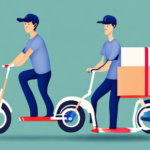A Brief History of Courier Services
Courier services have evolved significantly from their ancient origins to the sophisticated global networks we see today. In ancient times, couriers such as message runners and carrier pigeons were employed to deliver messages and small packages. The invention of the printing press in the 15th century increased the demand for reliable delivery of books, newspapers, and official documents.
The 19th and 20th centuries witnessed the expansion of courier services alongside the growth of railways, airlines, and automobiles. These advancements enabled the global reach of companies like UPS, FedEx, and DHL.
During World Wars I and II, couriers played a vital role in delivering critical messages, documents, and supplies to military personnel on the front lines, utilizing methods such as pigeons and dogs. The post-war period saw a boom in courier services, driven by the rise of international trade and the advent of e-commerce in recent decades, which has further accelerated the demand for fast and reliable delivery solutions.
The Role of Technology and Innovations in the Courier Industry
Advanced Tracking Systems
Technology has revolutionized the courier industry, enhancing speed, efficiency, and reliability. GPS tracking systems now allow for real-time monitoring of packages, providing both companies and customers with up-to-date information on delivery status.
Automation and Robotics
Automation systems and robotics are increasingly used to sort and handle packages, streamlining operations and reducing the likelihood of human error. These technologies enable courier companies to manage large volumes of shipments more effectively.
Drone and Autonomous Vehicle Deliveries
Innovations such as drone deliveries are being tested to reach remote or congested areas, aiming to reduce delivery times and operational costs. Additionally, autonomous vehicles are being explored for urban deliveries, which could further enhance efficiency and mitigate traffic-related delays.
Cybersecurity and Data Privacy
With the integration of advanced technologies, courier companies must prioritize cybersecurity and data privacy. Protecting customer data and ensuring the security of tracking systems are critical to maintaining trust and safeguarding against potential breaches.
Top 10 Biggest Courier Companies in the World
The largest courier companies are ranked based on factors such as revenue, market share, and global presence. The top 10 biggest courier companies globally include:
UPS, founded in 1907 and headquartered in the United States, is the largest courier company globally, operating in over 220 countries and territories with a workforce exceeding 500,000 employees. Besides standard courier services, UPS offers supply chain management and freight services.
FedEx, established in 1971 and also based in the United States, ranks as the second-largest courier company worldwide. It operates similarly across more than 220 countries and territories and employs over 500,000 individuals. FedEx diversifies its offerings with e-commerce solutions and printing services.
Comparative Analysis of Leading Courier Companies
Strengths and Specializations
Each top courier company has unique strengths:
- UPS is renowned for its extensive tracking system.
- FedEx excels in fast delivery times.
- DHL boasts a robust global network.
- TNT Express specializes in Euro-road freight.
- Japan Post is known for reliable domestic services.
- Canada Post emphasizes sustainability.
- China Post offers affordable international shipping.
Customer Service Excellence
Top courier companies like UPS and FedEx provide 24/7 customer support to address any issues promptly. In contrast, smaller companies may lack the resources to offer similar levels of customer service.
Environmental Impact and Sustainability
Many leading courier companies are committed to reducing their carbon footprint. Initiatives include the use of electric or hybrid vehicles, sustainable packaging practices, and investments in renewable energy. Companies prioritizing sustainability might prefer services from Canada Post or DHL, which have made significant environmental commitments.
The Global Impact of Courier Companies on E-commerce
Facilitating International Trade
Courier services are integral to the growth of e-commerce, enabling seamless international transactions by ensuring timely and secure delivery of goods. This global connectivity supports businesses of all sizes in reaching a wider market.
Environmental Contributions
Courier companies are adopting eco-friendly practices such as utilizing electric vehicles and bicycles for urban deliveries. These measures help reduce carbon emissions and traffic congestion, benefiting both the environment and urban living conditions.
Challenges Faced by Courier Companies
Rising Operational Costs
Increasing fuel prices and the need for continual technological upgrades pose significant challenges. Balancing cost-effectiveness with the implementation of advanced delivery solutions is a constant pressure.
Environmental and Regulatory Pressures
As environmental regulations tighten, courier companies must invest in sustainable practices, which can be costly, especially for smaller firms with limited resources.
Security and Privacy Concerns
The reliance on digital tracking systems raises concerns about cybersecurity and data privacy. Ensuring robust protection against breaches is essential to maintain customer trust.
Impact of the COVID-19 Pandemic
The pandemic has heightened demand for contactless deliveries and disrupted global supply chains, compelling courier companies to adapt swiftly to changing circumstances.
The Future of Courier Services: Emerging Trends
Automation and Artificial Intelligence
Automation and AI are set to further streamline operations, from sorting packages to optimizing delivery routes, enhancing overall efficiency.
Blockchain for Enhanced Security
Blockchain technology offers a secure and transparent method for tracking packages and verifying their authenticity, reducing the risk of fraud and improving delivery processes.
Continued Growth of E-commerce
The ongoing expansion of e-commerce will continue to drive demand for innovative and efficient courier services, with home delivery remaining a preferred option for consumers.
Innovations in Delivery Options
Same-Day and Express Deliveries
Same-day and express delivery services are becoming increasingly popular, catering to consumers' demand for faster delivery times.
Drone and Autonomous Vehicle Deliveries
Testing of drone deliveries and autonomous vehicles is expanding, aiming to enhance delivery speed and reduce operational costs. These technologies hold promise for overcoming logistical challenges in densely populated or remote areas.
Alternative Delivery Methods
Courier companies are exploring pick-up points, locker systems, and other flexible delivery options to accommodate varying customer needs and preferences.
Sustainability Practices in the Courier Industry
Adoption of Alternative Fuels
Leading companies like DHL and FedEx are investing in electric and hybrid vehicles to lower carbon emissions and promote sustainable transportation.
Optimizing Delivery Routes
Advanced route optimization algorithms help reduce fuel consumption and increase delivery efficiency, contributing to environmental sustainability.
Reducing Packaging Waste
Courier companies are implementing sustainable packaging solutions, such as recyclable materials and minimalistic packaging designs, to minimize waste.
Partnerships for Carbon Offset
Collaborations with environmental organizations enable courier companies to offset their carbon footprint through initiatives like tree planting and renewable energy projects.
Adaptations of Courier Services During the COVID-19 Pandemic
Health and Safety Measures
Courier companies have implemented enhanced sanitization protocols, contactless deliveries, and social distancing measures to protect both employees and customers.
Expansion of Delivery Services
In response to increased e-commerce demand, companies have expanded services to include same-day and next-day deliveries, as well as specialized delivery options for essential items like medical supplies and groceries.
Support for Local Businesses
Partnering with local businesses to provide delivery services has helped support small enterprises during the pandemic, fostering community resilience.
Cost Comparison: Finding the Best Value in Courier Services
Pricing Factors
Courier service costs vary based on destination, package size, and weight. It's essential to compare prices while considering delivery timeframes and service reliability to determine the best value.
Additional Services
Evaluate whether courier companies offer value-added services such as package tracking, insurance, and customer support, which can enhance the overall value even if the base price is higher.
Case Studies and Data
According to the 2023 Statista report, companies like FedEx and UPS maintain competitive pricing structures while offering comprehensive service packages, making them preferred choices for many businesses.
Customer Service Standards and Policies of Top Courier Companies
Real-Time Tracking and Transparency
Leading courier companies provide real-time tracking to ensure transparency and keep customers informed about their package's status.
Responsive Support Services
24/7 customer support teams are available to address inquiries, resolve issues, and provide assistance, ensuring a positive customer experience.
Delivery Guarantees
Service-level agreements and delivery guarantees offer customers assurance regarding the timeliness and reliability of their shipments.
The Impact of Social Media on Courier Companies' Reputation
Online Presence and Engagement
A strong social media presence allows courier companies to engage with customers, share updates, and respond to feedback promptly.
Managing Negative Feedback
Addressing negative experiences swiftly on social platforms is crucial to preventing potential damage to the company's reputation and maintaining customer trust.
Brand Building and Trust
Positive interactions and transparent communication on social media help build brand loyalty and enhance the overall reputation of courier companies.
Career Opportunities in the Global Courier Industry
Diverse Roles
The courier industry offers a wide range of career opportunities, including roles such as delivery drivers, logistics planners, IT specialists, and customer service representatives.
Career Growth and Development
Leading courier companies provide attractive compensation packages, comprehensive training programs, and clear pathways for career advancement, making the industry appealing to job seekers.
Industry Demand
With the continuous growth of e-commerce and global trade, the demand for skilled professionals in the courier sector remains robust, offering job security and growth potential.
As the courier industry continues to expand and adapt to new challenges, staying informed about the latest trends, innovations, and best practices is essential. Understanding the dynamics of the largest courier companies provides valuable insights into their pivotal role in global trade and the ever-evolving landscape of e-commerce.




















